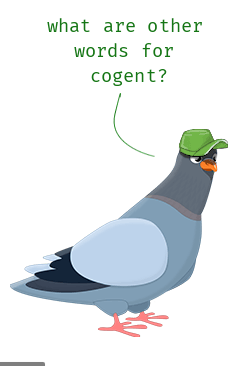1.
Four great words to use when describing and complimenting a person's communication skills are articulate, eloquent, coherent, and cogent.
Both articulate and eloquent are used to describe superb communication skills. Eloquent is synonymous with articulate. Use articulate to describe someone who is able to communicate clearly. Use eloquent to describe someone who is articulate, and in addition, is also moving and persuasive. Use the word coherent to describe logical and easily understood communication. Finally, the word cogent is used to describe both coherent and convincing communication.
If you were to present your position in a cogent manner, you would articulate your ideas in a coherent and convincing manner; that is, your audience would understand you and most likely agree with you when you were finished explaining your ideas. Here are some examples to recap:
The actor gave an eloguent acceptance speech that was very moving. He is an articulate speaker who seems to always find the right words to articulate his ideas. He spoke in a coherent manner, so that everyone in the audience could clearly grasp his ideas and concepts. The attorney presented a cogent closing argument that coherently and convincingly supported his case.

2.
What words can you think of that denote congratulation, praise, or honor? This next word group has four such words: acclaim, accolade, kudos and commendation.
Acclaim refers to public and enthusiastic approval. When a play or novel receives very good reviews from critics, it is said to have received "critical acclaim." Acclaim can be used as both a noun and a verb. A person can be acclaimed (that is, publicly praised) for something, or be given acclaim. Accolade is a more formal way of saying award. An accolade is formal praise or approval, and is often in the form of something tangible, like a trophy or medal. Accolade can also be a more formal or sophisticated way of saying "applause." Kudos is also an expression of approval or praise, but it doesn't have to be public. In fact, it can be used rather informally: Let's say you want to congratulate someone for doing something well; rather than simply saying, "Good job," you could say, "Kudos [to you on a job well-done!]" But kudos also refers to the public praise or glory that comes with fame..."Celebrity carries with it a certain amount of kudos." A commendation is a statement of praise, or, like an accolade, a formal prize or award received in recognition. All these words are very similar and the use of one of these words over another depends largely on context.
To recap the nuances: Acclaim is mostly used in the context of "critical acclaim" or "public acclaim," such as is given in a public forum, like a newspaper. Accolade is also public, but is given in front of a (usually large) public audience, like an awards show. Kudos can refer to either of these, but is also a great, quick way, to offer praise.
To summarize: Let's say an actor did a great job in his most recent role. He received critical acclaim for his performance, later receiving an accolade in the form of an Academy Award. A friend later congratulated him, saying, "Kudos on your performance and the award." Later that year, the film's director gave him the ultimate acting commendation, a role in his next film.

3.
What are some words you might use to convey that someone is good or skilled at something? Five adjectives that do this well are adept, apt, adroit, deft, and dexterous.
Adept and apt both mean skillfull. When deciding to use adept versus apt, use adept in sentences where something or someone is adept (skilled) at doing something and use apt in sentences where you are directly describing the person. For example: "He is an apt (skilled, proficient) pupil who is adept (skilled) at learning new subject matter." Deft means "skillful," but also denotes being quick and adept. To do something deftly is "to do it skillfully." Deft is synonymous with adroit and adept, and all three words mean "skillful." Adroit means mentally and physically skillful (almost possessing natural skill), while adept means skillful from experience. To be deft is to be skillful, as well as clever and fast. The adverb form of deft, deftly, is used more commonly than the adjective. To say that someone did something deftly is a high compliment, as it denotes that the person used skill and intelligence, as well as cleverness, speed, and control. So, to describe a soccer player's skill, you might say: "The soccer player deftly maneuvered the ball down the field," not, "He is a deft soccer player." Adept would usually be a better option to describe a person with skill. Remember that all these words would be great to use during an interview to help you describe yourself and show yourself to be a skilled and intelligent person. - "I am an apt employee, adept at assimilating new information. I am confident that I will be able to deftly handle our clients' needs." Adroit, deft, and adept are synonymous with dexterous. These words, however, do not have as strong of a noun form as dexterous has with dexterity. Dexterity is a very powerful and sophisticated word for denoting skill. For example: He showed great dexterity out on the court.
To recap: A tennis player who is naturally gifted in his sport, is an apt player. He will certainly be adept (skilful) at serving and will deftly (skillfully and cleverly) return great shots to his opponent. He should also be adroit (mentally skilled) at reading the direction of the ball coming off his opponent's racket. And, of course, one cannot be a great tennis player without having great dexterity (skill and agility).